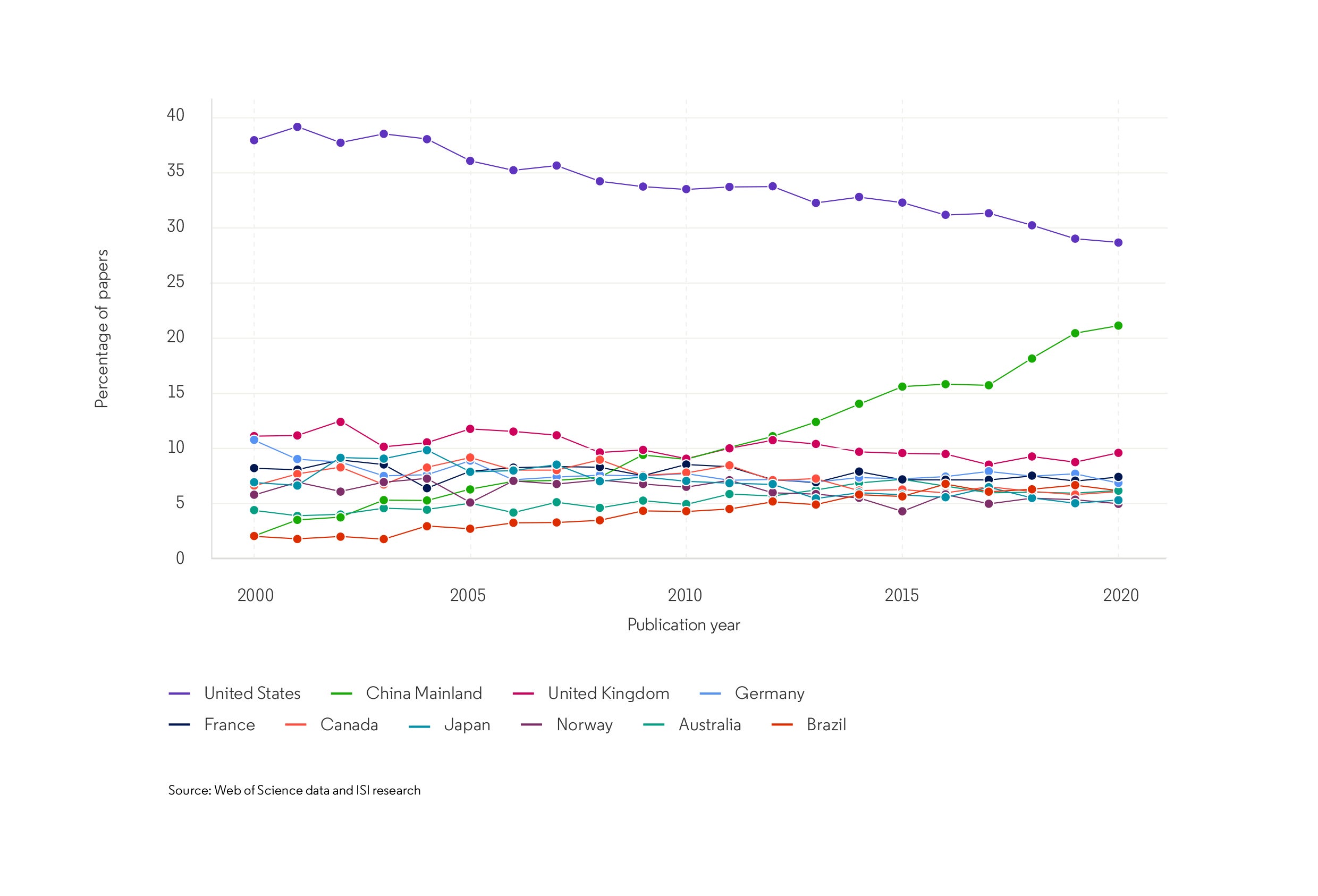A new Global Research Report from the Institute for Scientific Information identifies the trends, challenges and opportunities in ocean science. Our ocean research report uncovers emerging topics and highlights the growing body of research in this area, particularly around sustainability and topics including microplastics in the ocean.
The ocean can be considered the best ally in fighting climate change, and as sweltering temperatures hit much of the northern hemisphere this summer, the importance of ocean research and observations cannot be overstated.
Ocean acidification, marine pollution and overfishing have caused tremendous damage to Earth’s oceans and the life within them. Therefore, the health and sustainability of our oceans remain a particular challenge for researchers worldwide. This is evident in the sheer volume of ocean research being produced year on year: we found that ocean science research articles have increased threefold between 2000 and 2020.
We analyzed this growing body of research using Web of Science™ data and InCites Benchmarking and Analytics™ Citation Topics (an article-level classification), with special attention to the five main ocean basins (Arctic, Atlantic, Indian, Pacific and Southern). We collected nearly three-quarters of a million ocean-science-related documents and, separately, identified just over 100,000 with a specific ocean basin focus.
Keep reading for an overview of our ocean research report findings or download our full report.
Ocean research trends
Our report surfaced some fascinating trends across the body of ocean science research in recent decades:
- In our ocean science document set, the two most prominent Web of Science subject categories were Marine Freshwater Biology and Geosciences, Multidisciplinary (each constituting 16% each of the document set).
- For our smaller selection of papers concerning ocean basins, at the Citation Topic Macro (high) level, the domains of Earth Sciences and Agricultural, Environment and Ecology dominate, together accounting for more than 90% of research within any ocean (with a roughly even share between the two in most oceans).
- At the Meso (medium) Topic level, the largest topic for all oceans is Marine Biology (27% in the Atlantic and up to 42% in the Southern Ocean), followed by Oceanography, Meteorology and Atmospheric Sciences (14% in the Atlantic to 32% in the Southern Ocean).
- Other major Meso Topic themes include Geology, Geochemistry and Geophysics (6 to 11%), Archaeology (4 to 8%), and Zoology and Animal Ecology (3 to 6%).
- Research within each ocean basin has increased about three times over the past 20 years, except the Pacific where research has increased four times.
- The Atlantic continues to be the ocean with the greatest research focus (in 2020 there were around 3,000 papers published), though Pacific research is catching up quickly.
- The polar oceans (Arctic and Southern) are the least studied (less than 500 papers published for each in 2020). This may be due to their greater inaccessibility; however, they may also be more affected by climate changes.
The U.S. dominance of ocean basin research in the early 21st century has now disappeared, mainly due to a rapid rise in output from Mainland China (Figure 1), particularly focusing on the Pacific Ocean. Ocean research trends also show that other G7 member states’ research shares have also declined due to Chinese growth. Some countries clearly focus their efforts on a single ocean: Russia accounts for about 30% of research in the Arctic Ocean; India about 27% in the Indian Ocean; and Mainland China about 27% in the Pacific. At the institutional level, research is mainly led by national academies such as the Russian and Chinese, or research institutes such as the U.S. National Oceanic and Atmospheric Administration (NOAA) or the British Antarctic Survey. This illustrates the highly specialized nature of ocean science and likely reflects its infrastructure-reliant nature.
Figure 1. The percentage of ocean basin papers for the ten biggest ocean research-producing countries from 2000 to 2020.

Sustainable oceans
The United Nations Ocean Conference was recently held in Lisbon, Portugal to mobilize action and address threats to the ocean. The conference dealt with themes including governance, the blue economy, sustainable oceans, protection and management, fisheries and pollution.
Using word term searches related to each theme, an analysis on paper titles within our ocean basin dataset showed that “protection and management” was the theme with the most papers, containing contributions from over 100 countries. The theme with the fewest papers was the blue economy. This illustrates that the former is already a well-established area of concern and research, while the latter is only just emerging as a field (in this analysis the first blue economy papers appeared in 2018). The dominant Citation level Topics were Marine Biology, accounting for more than one third of papers in any theme, and Fisheries. These topics demonstrate the importance of sustainable oceans to be able to protect, manage and develop.
The Ocean Conference was designed to support the implementation of United Nations Sustainable Development Goal (SDG) 14: Life below water. SDG 14 has 10 targets with the overarching goal to “conserve and sustainably use the oceans, seas and marine resources for sustainable development.” Defined subgoals include “[preventing] and significantly [reducing] marine pollution of all kinds, in particular from land-based activities, including marine debris and nutrient pollution by 2025” and “[increasing] the economic benefits to Small Island developing States and least developed countries from the sustainable use of marine resources, including through sustainable management of fisheries, aquaculture and tourism by 2030.”
Microplastics in the ocean a growing concern
Microplastics are extremely small pieces of plastic debris found in the environment as a result of the disposal and breakdown of consumer products and industrial waste. Two differing analyses drawing on Citation Topics data illustrate the astonishing growth of microplastics research. The number of items within the Microplastics topic increased from 289 in 2015, to 887 in 2018, and to over 2,000 in 2020. Similar trends in output are found regarding research focusing on the ocean basins. The upsurge in output is reminiscent of the excitement and activity of high-temperature superconductivity in the late 1980s, or CRISPR (i.e., gene editing) during the last decade. While the topic of microplastics in the ocean has long been studied, the introduction of SDGs in 2015 as well funding in support of these may have prioritized and accelerated research in this area.
Growth in other Citation Topics that we observed, such as Climate Change, may also be associated with the issuance and targets of SDGs. Climate change research is inherently linked to ocean science through the interactions between the ocean and atmosphere. The Climate Change topic has received increasing attention since 2000 and, again, particularly since 2015, coinciding with the SDGs. When focusing on ocean basins, Arctic Ocean papers have a greater relative share of climate change papers, demonstrating the precariousness of environments in that region. For a more in-depth and global perspective on climate change, including topical and collaboration analysis, please read our recent ISI Insights paper.
Ocean research opportunities
Our ocean basin analysis illustrates the globally connected research networks within ocean science. This includes the large, research-intensive countries (such as the United States) collaborating with island nations and territories at the literal forefront of ocean science (e.g., New Caledonia, Bermuda). However, sub-Saharan African contributions, apart from those of South Africa, in the global network are minimal despite the continent’s extensive coastline. External partnerships are likely required to build or operate the necessary infrastructure for ocean research opportunities within sub-Saharan Africa. Desires to achieve the SDGs may drive such partnerships.
Looking ahead
The global importance of ocean science is undeniable. This significance is recognized by United Nations programs such as the Sustainable Development Goals (particularly Goal 14: Life below water) and the 2022 Ocean Conference. Research must rise to meet the challenges presented by issues such as microplastics pollution and climate change. Only with concerted, global commitment will the UN goals for the future – oceans that are clean, resilient and sustainable – stand a chance of accomplishment.
Interested in learning more about ocean research and sustainability concerns? Read our Global Research Report, here.





